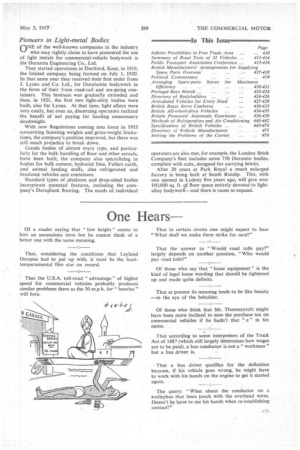One Hears—
Page 67

If you've noticed an error in this article please click here to report it so we can fix it.
Of a reader saying that "low height" seems to him an anomalous term but he cannot think of a better one with the same meaning.
That, considering the conditions that Leyland Octopus had to put up with, it must be the leasttemperamental film star on record.
That the U.S.A. toll-road " advantage " of higher speed for commercial vehicles probably produces similar problems there as the 30 m.p.h. for " heavies" will here. That in certain circles one might expect to hear "What shall we make them strike for next?"
That the answer to "Would road tolls pay?" largely depends on another question, "Who would pay road tolls?"
Of those who say that "loose equipment" is the kind of legal loose wording that should be tightened up and made quite definite.
That at present its meaning tends to be like beauty —in the eye of the beholder.
Of those who think that Mr. Thorneyeroft might have been more inclined to ease the purchase tax on commercial vehicles if he hadn't that " e " in his name.
That according to some interpreters of the Truck Act of 1887 (which still largely determines how wages are to be paid), a bus conductor is not a " workman" but a bus driver is.
That a bus driver qualifies for the definition because, if his vehicle goes wrong, he might have to work with his hands on the engine to get it started again.
The query: "What about the conductor on a trolleybus that loses touch with the overhead wires. Doesn't he have to use his hands when re-establishing contact?"












































































































































































































































